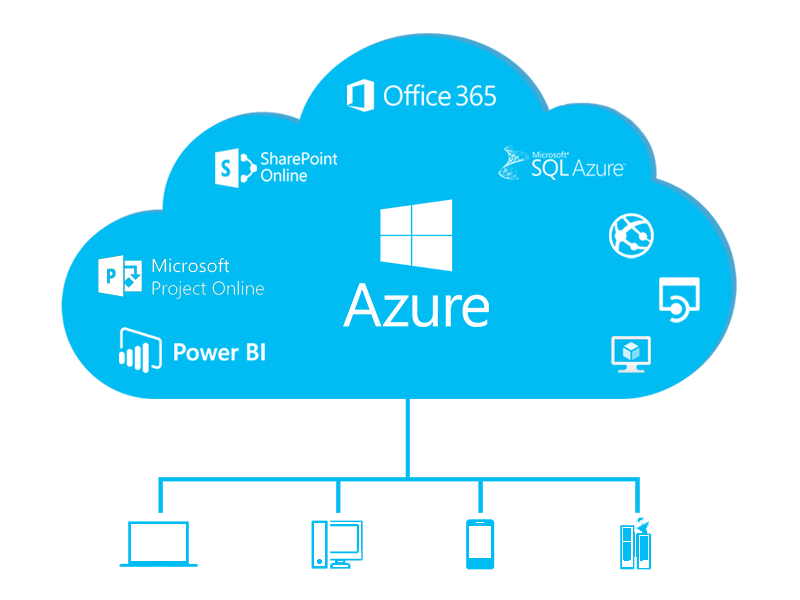
Technology has been shaping the way we do business for decades. Across all sectors, the traditional processes, practices, and workflows are transformed due to the increasing reliance on technology. At Everything Tech, we have seen this, particularly in the increasing importance that cloud computing has in the business.
We are not alone in feeling that the cloud is a crucial business technology, either. Many business leaders around the world have been placing the cloud, and digital transformation in general, as a high priority for their organisation. Yet there are still plenty of businesses out there who have yet to take the plunge and may even be reluctant to do so. We hope that we can make a strong case as to why businesses in 2022 should migrate to the Cloud.
Cloud Computing
At Everything Tech, we have been cloud-based for quite some time. As Microsoft Gold Partners, we believe in the flexibility and agility that an organisation can achieve by moving to a cloud-based IT infrastructure.
Considering how many options there are in terms of public cloud service providers – from Amazon Web Services, and Google Cloud, to Microsoft Azure (our favourite, of course), the cloud is becoming more and more commonplace a solution. Whether a business opts for the more straightforward lift & shift migration or chooses to undertake a comprehensive, cloud-optimized migration, there are lots of benefits to be had.
Security
The money and resources that go into public cloud services mean that they are a much better option for security than on-premises infrastructures that an organisation manages themselves.
When a company keeps its infrastructure in-house, it means they are relying on servers and other hardware that they need to keep updated. This means that, to a certain extent, their cyber security is only as good as the technology they are using. Public cloud service providers invest billions of dollars a year in keeping their data centres up to date with the most cutting-edge hardware and software.
Furthermore, cloud service providers invest a lot of money in research and development for cloud security, meaning that they are also helping facilitate security innovations, and their customers get all the benefits of those innovations.
Data Redundancy
It is much easier to guarantee data redundancy when you partner with a public cloud provider, as opposed to running your infrastructure.
Data redundancy relies on ensuring that a company’s data is never tied to a single location. For businesses that still rely on servers in their office, this means that they have very low data redundancy or none at all. For businesses that have a network of distributed servers, or data centers, data redundancy will be much higher.
However, the costs involved in running a distributed network like that are immensely high. This is why many businesses prefer to host their infrastructure in a public cloud that runs on a distributed network of datacentres that are maintained by the provider. These businesses get all the benefits of data redundancy at a much lower price point compared to if they ran a private cloud or on-premise infrastructure.
Lower Long-term CapEx
The capital expenditure involved with setting up a private infrastructure may be very high – considering the amount of hardware, software, and manpower that a business needs to invest in. It is this expenditure that makes many businesses reluctant to migrate to a whole new infrastructure – it may seem to them like all that investment and effort is going to waste.
However, considering the long-term savings that a business can make by hosting their infrastructure in the cloud, the opposite is true; you stand to save a lot of money by migrating to a future-proof, scalable solution like the cloud. With the cloud, you don’t have to invest in new hardware for your infrastructure every few years, and scaling your infrastructure does not require additional hardware investment, either.
Lower Operational Costs
In addition to capital expenditures getting cut down with the cloud, businesses can also expect to lower their operational costs when they migrate to the cloud. Consider the operational costs involved with running an on-premise infrastructure. You have upgrades to hardware and software, system administration, software patching, update management, etc.
Firstly, hardware upgrades are eliminated when you migrate to the cloud. Secondly, system administration, update and patch management, and many other software-related operations are made much simpler and cheaper with the cloud. For instance, with SaaS applications and systems, updates and patches are rolled out by the provider automatically, at no extra cost; and if a business is hosting its applications in the cloud, the process of rolling out patches and updates is more streamlined with the cloud – thus you are saving billable hours spent on administration and system maintenance.
Scalability
When a business is growing steadily, it means it can expect to need to scale its infrastructure up to meet the increasing operational demand. In that situation, having an infrastructure that can be scaled up quickly and easily is incredibly useful – which is one of the main things that the cloud is known for.
A public cloud service makes it very easy to increase the usage of their resources – whether it be storage, computing, etc. As a business, you simply up the amount of storage you are utilizing in the cloud, or add additional licenses for your new staff – the changes to your infrastructure will occur almost instantly and are reflected in your monthly bill. This works in the inverse, too. So, businesses with seasonal fluctuations in their sales or service demand (such as those in hospitality or retail), can scale their infrastructure down during periods of low demand just as easily as they can scale it up.
Remote & Hybrid Working
The cloud supports a more diverse array of working arrangements with no impact on operational efficiency.
Businesses that relied on an on-premise, physical server-based infrastructure experienced operational difficulties during the height of the Covid-19 pandemic when they had to adopt remote working. This is because their infrastructure simply wasn’t designed for remote work, and therefore performance was impacted. On the other hand, the cloud is ideal for either on-premise or remote work. Here at TechQuarters, for example, the transition from in-office to remote working was very straightforward when it came to ensuring all our employees had the resources they needed to work from home.
Many businesses now are choosing a hybrid work arrangement, where employees can choose whether to work in the office, from home, or even split time between the two. Furthermore, having that flexibility enables a business to expand its pool of talent beyond the restrictions of geographical location.
Would you like more information about Managed IT Support or other Everything Tech Services? Contact one of our Expert team today!


